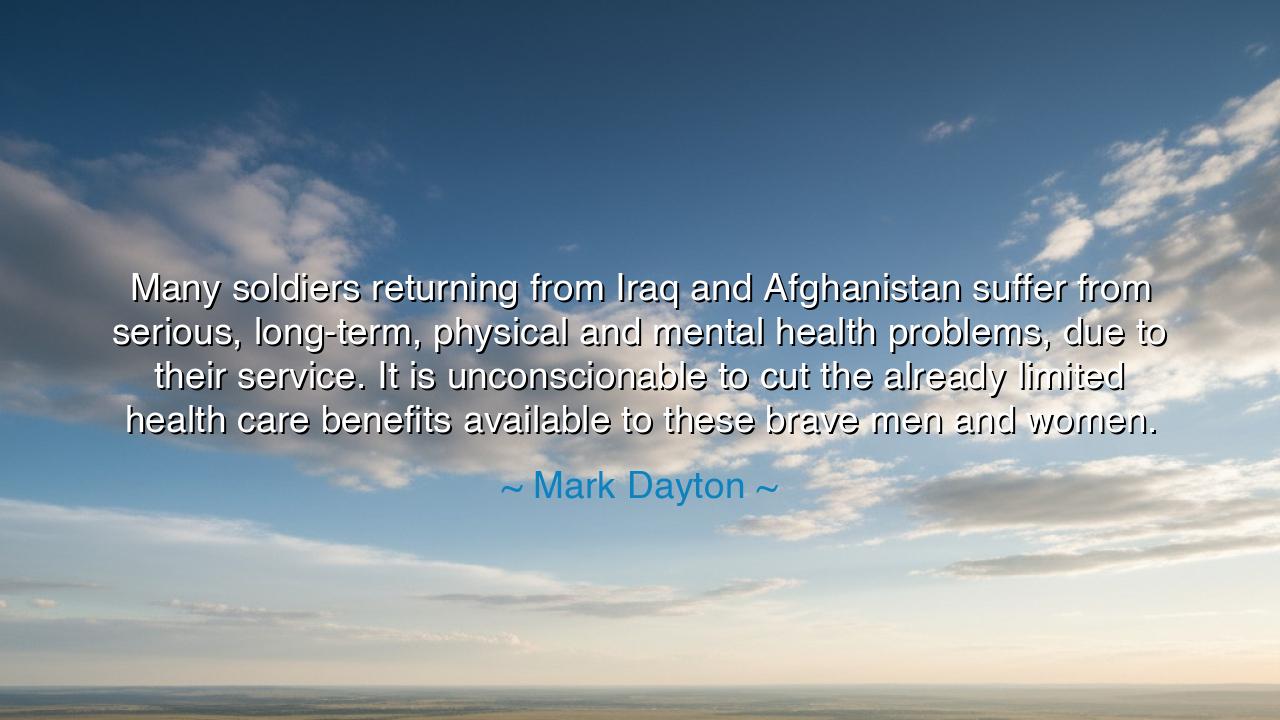
Many soldiers returning from Iraq and Afghanistan suffer from
Many soldiers returning from Iraq and Afghanistan suffer from serious, long-term, physical and mental health problems, due to their service. It is unconscionable to cut the already limited health care benefits available to these brave men and women.






In the solemn words of Mark Dayton, spoken not as a politician but as a guardian of justice, we hear an ancient truth reborn: “Many soldiers returning from Iraq and Afghanistan suffer from serious, long-term, physical and mental health problems, due to their service. It is unconscionable to cut the already limited health care benefits available to these brave men and women.” These words, heavy with compassion and moral gravity, carry the echo of centuries — the eternal cry that those who have borne the sword in defense of others must not be forgotten when they lay it down. It is a cry as old as war itself, a reminder that sacrifice demands remembrance, and that honor means nothing if it is not followed by care.
Since the dawn of nations, soldiers have stood as the shield of civilization. They have marched into the dust of battle so that others might wake to peace. In Iraq and Afghanistan, as in the wars of old, countless men and women gave not only their strength, but the calm of their minds, the ease of their sleep, the simple joy of peace within. They returned home not as they left, carrying wounds both seen and unseen — the scars of explosion and the silent torment of memory. And yet, too often, the world greets them with silence, bureaucracy, and neglect. Thus, Dayton’s words ring as both accusation and prayer — a demand that the covenant between soldier and nation be kept.
History bears witness to this sacred duty again and again. When the warriors of ancient Rome returned from distant campaigns, their triumphal processions were followed by years of struggle and poverty, as the empire they defended turned its gaze elsewhere. The great general Cincinnatus, once called from his plow to save his people, returned to his farm not with riches, but with humility — a man forgotten by the very republic he preserved. So too, in our own age, many veterans return not to glory but to hardship, finding themselves abandoned by the systems that owe them everything. To neglect them, as Dayton declares, is not only a political failure — it is unconscionable, a moral betrayal.
The physical wounds of war are grievous — the shattered bones, the burned skin, the limbs left behind in desert sands. But the mental wounds, though invisible, are no less real. The spirit can break as easily as the body. The names change — PTSD, trauma, depression — yet the suffering remains the same as that of the ancient soldier who woke screaming from dreams of battle. The courage that once steadied the hand in war now trembles in the quiet of the night. To deny these men and women the healing they deserve is to turn our backs on the very idea of civilization. For what is a nation that honors its warriors only in victory, but forgets them in peace?
Dayton’s words call us to a higher code — one not of conquest, but of compassion. He reminds us that those who return from war do not need parades or medals as much as they need care, understanding, and dignity. They need not only hospitals and therapy, but human recognition — the assurance that their suffering has meaning, that their country sees them, hears them, and stands beside them. To cut their health care, as he warns, is to strip away not only their benefits, but their worth in the eyes of society. And that, truly, is the most grievous wound of all.
Consider the tale of Private Thomas Young, an American soldier who served in Iraq and returned paralyzed and broken, yet became a voice for those like him. His body was frail, but his spirit burned fierce with truth. In his final letters, he wrote not in bitterness, but in sorrow — sorrow that the promises made to veterans were so often broken. His life stands as a living testament to Dayton’s warning: that it is unconscionable to demand the ultimate sacrifice and then deny the compassion that must follow it.
The lesson, then, is as clear as it is timeless: a nation’s greatness is measured not by the wars it wins, but by the way it treats those who fought them. To care for the wounded, the weary, the haunted — this is not charity, but justice. Let every citizen, every leader, every heart take this vow: to remember the warriors not only when the drums of war are loud, but when the world has gone quiet. Support the clinics. Defend the funding. Speak for those whose voices falter under the weight of pain.
For when we lift up those who once defended us, we restore the very soul of our civilization. In the words of Mark Dayton, let us remember that to abandon the wounded is to betray the sacred bond between protector and protected. And let future generations say of us — they did not forget their heroes; they healed them.






AAdministratorAdministrator
Welcome, honored guests. Please leave a comment, we will respond soon